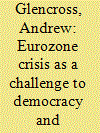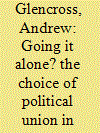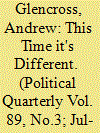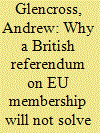|
|
|
Sort Order |
|
|
|
Items / Page
|
|
|
|
|
|
|
| Srl | Item |
| 1 |
ID:
126760


|
|
|
|
|
| Publication |
2013.
|
| Summary/Abstract |
This article explores how both the sovereign debt crisis and the European Union's response illustrate fundamental characteristics of contemporary European integration. In the face of an unexpected emergency, national politicians took the lead and pressed ahead with more integration. The long-term results though depend on national acceptance of not just the bailout provisions but also enforcement of debt brakes mandated by the new EU treaty. This means democratic politics at the national level will continue to have a fundamental influence on EU affairs, while the North/South split will co-exist alongside a more marked separation between countries inside and outside the Eurozone. In this context of increased political turbulence within the EU, there is likely to be only a limited window of opportunity for successful negotiation of a free-trade deal with the United States.
|
|
|
|
|
|
|
|
|
|
|
|
|
|
|
|
| 2 |
ID:
142561


|
|
|
|
|
| Summary/Abstract |
Although most attempts to foster interdisciplinary dialogue are located outside mainstream International Relations (IR), this article seeks to problematize how the two dominant paradigms of IR theory, realism and liberalism, think historically. The argument proceeds by examining how the disciplines consider what historical knowledge is useful for, that is, how they think historically or are historically conscious. This constitutes a shift away from the dominant dialogue over how to ‘do history’ in IR. Historical consciousness is defined as the understanding of the temporality of historical experience or how past, present and future are thought to be connected. The analysis is set up to explore the extent to which both disciplines share a similar historical consciousness beyond merely treating history as instructive. To do so the article first examines the canon of European historiography to identify three genres of historical consciousness: history as teacher, history as narrative, history as representation. This survey of pre-positivist historiography serves to show the complexity of historical reflection within that discipline, something against which variance within IR theory can also be compared. Disciplinary comparison reveals that three genres of historical consciousness are present in liberalism and realism: lessons of history, revenge of history, and among progressive realists a speculative escape from history genre. Whereas lessons of history spans both ‘isms’ in IR, realism is shown to have a more complex understanding of temporality, thereby providing another conceptual starting point for distinguishing between these two ‘traditions’. Moreover, these differences between genres of historical consciousness used within realism capture the split between realists that lies not in the origin of anarchy itself but in how realists think historically. What emerges, therefore, by comparing how disciplines think historically rather than ‘do’ History, is the equally purposive or even political use of the historical knowledge they produce.
|
|
|
|
|
|
|
|
|
|
|
|
|
|
|
|
| 3 |
ID:
141764


|
|
|
|
|
| Summary/Abstract |
This article explores the inter-related debates over Britain's relationship with the EU and that over the future of the UK. It argues that euroscepticism and Scottish independence are based on exceptionalist identities that now revolve around economic policy. Elite euroscepticism cleaves to a neoliberal vision of minimalist regulation, while advocates of Scottish independence claim Westminster's austerity policies make the British Union incompatible with social democracy. However, this presentation of the choice facing British voters ignores the serious contradictions that overhauling the current order entails. Both forms of exceptionalism fail to recognize the significant limitations of self-government outside and within the EU. If Conservatives can contain their neoliberal flirtation with EU withdrawal they are very well placed to prosper electorally. The dilemma of which union(s) to choose might thus constitute the prelude to the entrenchment of the economic and political order that gave rise to such contestation in the first place.
|
|
|
|
|
|
|
|
|
|
|
|
|
|
|
|
| 4 |
ID:
161692


|
|
|
|
|
| Summary/Abstract |
British political debate since the EU referendum has hinged on what type of Brexit to pursue: hard or soft. Yet, unlike in instances of treaty rejection, the EU made no counter offer to avoid a breakdown in relations that would follow the hardest of exits. This remarkable unity in not discounting the possibility of a hard Brexit demonstrates that UK withdrawal is very distinct from previous wrangles over EU reform. Drawing on the work of Kissinger, this article argues Brexit is a revolutionary act that denies the legitimacy of the EU order. Hence this process does not conform to other episodes of differentiation. When Westminster sought opt‐outs, it did not reject the core principles of integration. By not seeking to oppose a hard Brexit, Brussels has forced the UK government to find a new legitimising principle to govern EU–UK relations, transferring the burden of adjustment to London.
|
|
|
|
|
|
|
|
|
|
|
|
|
|
|
|
| 5 |
ID:
138348


|
|
|
|
|
| Summary/Abstract |
This article scrutinizes the merits of holding a referendum over UK membership of the EU. It queries the assumption that direct democracy can somehow resolve the longstanding Europe question in British politics. To do this, the analysis traces the existence of an exceptionalist approach to the EU within Britain, now associated with re-negotiating UK membership in the shadow of a referendum. The article argues that the prospects for a radical reconfiguration of the UK's treaty obligations are slim, thereby increasing the risk of a vote to withdraw. Yet withdrawal would be the opposite of a simple solution to the Europe question. Political and economic interests dictate lengthy politicking over a highly complex post-Brexit settlement revisiting free movement of goods, services, capital and people. Such negotiations undermine any mooted cathartic benefits of a popular vote, while Eurosceptics will remain dissatisfied in the event of a yes, a result likely to further destabilize the Conservative Party. Consequently, the simplicity and decisiveness that a referendum—particularly one that spurns the EU—promises is merely a mirage as relations with the EU necessarily form part of an enduring British political conversation.
|
|
|
|
|
|
|
|
|
|
|
|
|
|
|
|
|
|
|
|
|